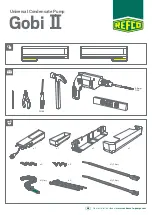
iv
TC-17005-rev.1
Refrigerant Precautions
To reduce the risk of serious injury or death, the following refrigerant
precautions must be followed.
●
As originally manufactured, this unit contains refrigerant installed by Johnson Controls. Johnson
Controls uses only refrigerants that have been approved for use in the unit’s intended home country
or market. Johnson Controls distributors similarly are only authorized to provide refrigerants that
have been approved for use in the countries or markets they serve. The refrigerant used in this unit
is identified on the unit’s faceplate and/or in the associated manuals. Any additions of refrigerant into
this unit must comply with the country’s requirements with regard to refrigerant use and should be
obtained from Johnson Controls distributors. Use of any non-approved refrigerant substitutes will void
the warranty and will increase the potential risk of injury or death.
●
If installed in a small room, take measures to prevent the refrigerant from exceeding the maximum
allowable concentration in the event that refrigerant gases should escape. The installation should
meet the requirements in ASHRAE Standards 15 and 34. If refrigerant gas has leaked during the
installation work, ventilate the room immediately.
●
Check the design pressure for this product is 601 psi (4.15MPa). The pressure of the refrigerant
R410A is 1.4 times higher than that of the refrigerant R22. Therefore, the refrigerant piping for
R410A shall be thicker than that for R22. Make sure to use the specified refrigerant piping. If not, the
refrigerant piping may rapture due to an excessive refrigerant pressure. Besides, pay attention to
the piping thickness when using copper refrigerant piping. The thickness of copper refrigerant piping
differs depending on its material.
●
When R410A is used, the refrigerant oil tends to be affected by foreign matters such as moisture,
oxide film, (or fat). Perform the installation work with care to prevent moisture, dust, or different
refrigerant from entering the refrigerant cycle. Foreign matter can be introduced into the cycle to such
parts as the expansion valve causing operational issues.
●
To avoid the possibility of different refrigerant or refrigerant oil being introduced into the cycle, the
sizes of the charging connections have been changed from R407C type and R22 type. It is necessary
to verify the appropriate tools are on hand before performing installation work.
●
Use refrigerant pipes and joints which are approved for use with R410A.
●
A compressor/unit comprises a pressurized system. Never loosen threaded joints while the system is
under pressure and never open pressurized system parts.
●
Before installation is complete, make sure that the refrigerant leak test has been performed. If
refrigerant gases escape into the air, turn OFF the main switch, extinguish any open flames and
contact your service contractor. Refrigerant (Fluorocarbon) for this unit is odorless. If the refrigerant
should leak and come into contact with open flames, toxic gas could be generated. Also, because the
fluorocarbons are heavier than air, they settle to the floor, which could cause asphyxiation.
●
When installing the unit, and connecting refrigerant piping, keep all piping runs as short as
possible, and make sure to securely connect the refrigerant piping before the compressor starts
operating. If the refrigerant piping is not connected properly and the compressor starts with
the stop valve opened, air may be pulled into the system and the refrigerant cycle will become
subjected to extremely high pressure, which can cause an explosion or fire.
●
Tighten the flare nut with a torque wrench in the specified manner. Do not apply excessive force to the
flare nut when tightening. If you do, the flare nut can crack and refrigerant leakage may occur.
●
When maintaining, relocating, and disposing of the unit, dismantle the refrigerant piping after the
compressor stops.
●
When pipes are removed out from under the piping cover, after the insulation work is completed,
cover the gap between the piping cover and pipes with additional insulating material (field-supplied).
If the gap is not covered, the unit may be damaged if snow, rain water or small animals enter the unit.
●
Do not apply excessive force to the stop valve when opening. If damaged, the stop valve could come
apart due to refrigerant pressure. At the test run, fully open the gas and liquid valves, otherwise,
these devices will be damaged. (It is closed before shipment.)
●
If the setup for outdoor units is incorrect, it may cause flowback of the refrigerant and result in failure
of the outdoor unit.
●
The refrigerant system may be damaged if the slope of the piping connection kit exceeds
+
15
o
.







































